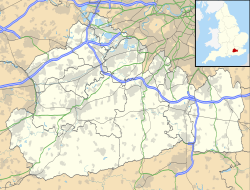Bugby Chapel
| Bugby Chapel | |||||||||||||||||||||||||||||||||||||||||||||||||||||
|---|---|---|---|---|---|---|---|---|---|---|---|---|---|---|---|---|---|---|---|---|---|---|---|---|---|---|---|---|---|---|---|---|---|---|---|---|---|---|---|---|---|---|---|---|---|---|---|---|---|---|---|---|---|
| Epsom and District Synagogue (last known as) | |||||||||||||||||||||||||||||||||||||||||||||||||||||

The former chapel from the southeast
|
|||||||||||||||||||||||||||||||||||||||||||||||||||||
|
|||||||||||||||||||||||||||||||||||||||||||||||||||||
Brick, stucco walls; tiled roof
Bugby Chapel is an 18th-century former chapel in the centre of Epsom, a suburban town in Surrey, England. Known by this name (or Bugby's Chapel) in reference to its Calvinistic founder William Bugby, it was also known as East Street Chapel and later, as it passed into the ownership of different religious groups, as Salem Unitarian Chapel, Salem Baptist Chapel and the Epsom and District Synagogue. More than 200 years of religious use ended when it was converted into an office. The chapel is a Grade II Listed building.
Epsom became a fashionable town in the 18th century, popular with businesspeople and wealthy merchants from London who wanted to live in a country town within easy reach of the city. Protestant Nonconformism emerged in the town soon after the Act of Uniformity 1662, when covert Presbyterian meetings took place; a chapel was built in 1724, and hundreds of worshippers attended. It was an era in which congregations frequently split and new churches were formed in accordance with the views of their ministers, and such a secession occurred in the 1770s when William Bugby, a preacher with strong Calvinistic views, came to Epsom. He was influenced by the well-known ultra-Calvinist William Huntington, who moved to Ewell in 1775 after experiencing a religious conversion and held meetings there. Bugby took out certificates for the registration of religious meeting houses in Epsom in 1777 and 1778.
In 1779, Bugby bought a plot of land "on a narrow lane behind the [then] main London Road" and erected a chapel. A house, later called Rose Cottage, was attached to this, and there was a burial ground to the northeast. William Huntington's name was recorded in the registers there in that year as one of the ministers who had conducted baptisms. Bugby was then invited to preach in Brockham, near Dorking, in 1780; his meetings were successful, and a chapel was built in 1783. Like the chapel in Epsom, its character was Independent Calvinistic. (Such worship was "closely associated with Surrey" in the 18th and 19th centuries; other chapels established for preachers with these views include Providence Chapel at Charlwood, founded in 1816). From 1783 until his death in 1792, Bugby ministered at both the Epsom and the Brockham chapel. He also registered other places of worship in Surrey villages such as Effingham, Leigh and Betchworth. The nature of worship at the chapel in its early years was not well understood: the Anglican vicar of Epsom stated in 1788 that "a few years ago a gardener ... collected money enough to build a small [meeting] house, where he now has a small and uncertain congregation of Methodists ... they are chiefly people of the lowest class". Also at this time, the name of the chapel was not fixed: Bugby Chapel or Bugby's Chapel were used, but East Street Chapel, Little Chapel and the Old Huntingtonian Chapel were also recorded.
...
Wikipedia

